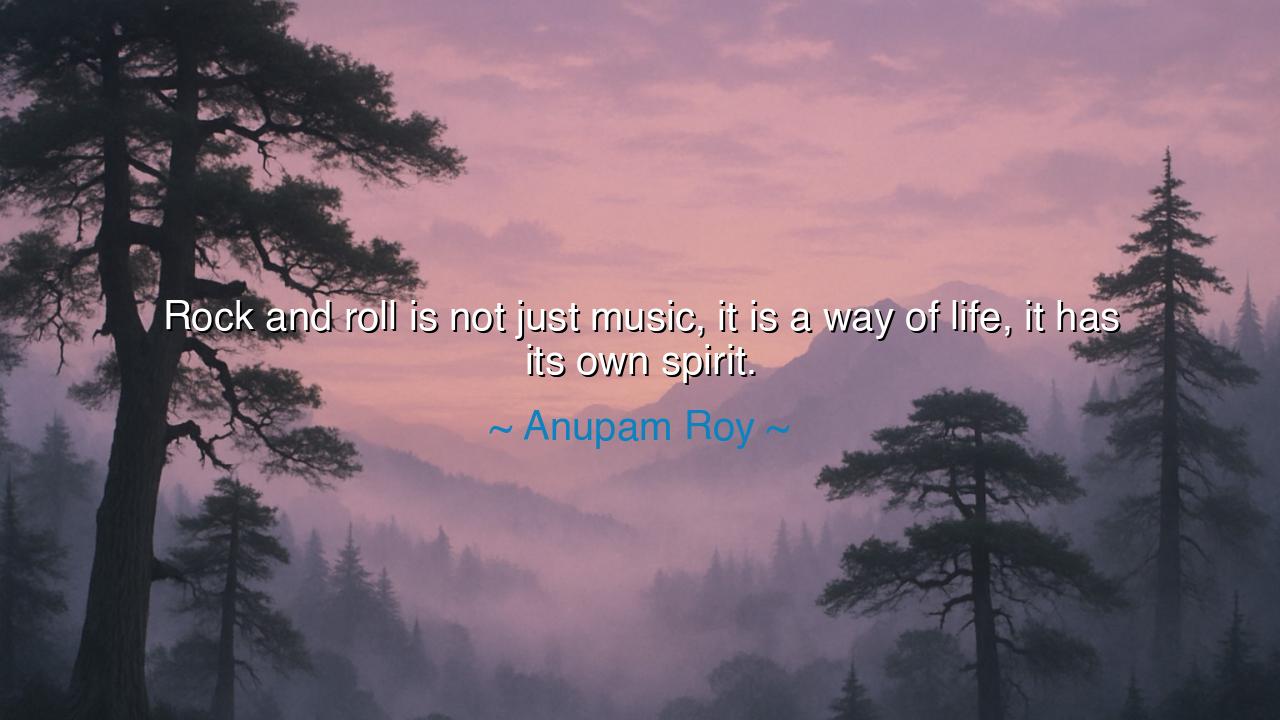
Rock and roll is not just music, it is a way of life, it has its






The words of Anupam Roy—“Rock and roll is not just music, it is a way of life, it has its own spirit.”—resound like the beating of a great drum that calls generations to rise, to rebel, and to live with passion. They remind us that true art is never confined to sound alone; it spills into the veins of its people, shaping how they walk, how they love, how they defy the darkness around them. Rock and roll is not merely melody—it is defiance, it is freedom, it is fire clothed in rhythm.
From its very birth in the mid–twentieth century, rock and roll carried a sacred unrest. Born of blues and gospel, it rose as a cry of the oppressed, a celebration of youth, a challenge to the rigid and the stale. When Elvis shook the world with his wild energy, when The Beatles crossed oceans with their songs, it was not simply about guitars and drums—it was about the breaking of chains, the tearing down of walls. This is why Roy declares it a way of life. It was not a style to imitate; it was a force to live.
We see this truth in the story of Woodstock, the legendary festival of 1969. There, half a million souls gathered, not only to hear music, but to live for a time in a world without division, without war, without silence. The songs of Jimi Hendrix, Janis Joplin, and others became more than entertainment—they became a declaration that another life was possible, a life where the human spirit could breathe free. Indeed, in those days, rock and roll was not just sound—it was a spirit that spoke of unity, rebellion, and love.
The ancients would have understood this. For them, music was never mere pastime, but a force that could shape character, ignite courage, and even heal the soul. The Greeks spoke of the “ethos” of music, how certain modes stirred bravery while others softened the heart. In this same way, rock and roll became the ethos of its age: a teacher, a liberator, a storm that swept through every corner of culture. Its spirit could not be contained, because it did not live in instruments alone—it lived in the hearts of those who heard it.
Anupam Roy, as a modern bard, recognizes this timeless truth. When he says rock and roll has its own spirit, he points to the unseen power that moves a crowd when the guitar roars, the drum thunders, and the voice cries out. It awakens something primal yet noble, something that says, “I will not bow. I will not live half-alive. I will dance, I will shout, I will be free.” It is no coincidence that every generation, when yearning for freedom, finds itself again in the arms of this music.
The lesson, then, is clear: find your spirit, and live your way of life with fire. Do not reduce your passions to hobbies, nor your gifts to trifles. Let them shape how you walk in the world. If rock and roll is your call, live it boldly. If painting, teaching, building, or healing is yours, then let it not be just work but a creed, a rhythm that carries through every breath of your existence. For it is only when we live our gifts as a way of life that they become immortal.
Practically, this means embracing authenticity. Do not wear the mask of conformity when your soul beats to another drum. Surround yourself with the voices, the art, and the people that awaken your truest self. Seek not only to consume music, but to live its message: courage, freedom, passion, and joy. Stand firm in your calling, for when you live in tune with your spirit, you too become like rock and roll—not just a sound in time, but a living force that moves the world.
Thus, let Anupam Roy’s words endure: rock and roll is not only notes on a guitar, but the roar of the human heart refusing to be silenced. It is proof that art, when it becomes life, transforms everything it touches. May you, too, find your song, your way of life, your spirit—and may you live it so boldly that generations will feel its echo long after the music has stopped.






AAdministratorAdministrator
Welcome, honored guests. Please leave a comment, we will respond soon